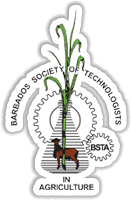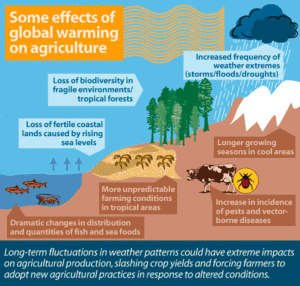
Global warming is a real phenomenon. We’re already experiencing its effects in terms of climate extremes resulting in drought , flooding and severe hurricanes. A warmer world will also affect food production, in terms of quality and quantity, in several ways:
- reduced seed germination under high soil temperatures, resulting in sparse crops stands
- negative effect on photosynthesis, ultimately leading to reduced growth and lower crop yields
- reduced pollen viability which then becomes a major limiting factor for fruit set
- delayed floral formation resulting in smaller fruits
- increased damage to crops from bacteria, fungi, and insect pests
- Increased weed competition for moisture, nutrients, and light since weeds are better adapted to drought conditions than crops. In addition, herbicidal controls are less effective under hot and dry conditions.
Higher temperatures will increase evaporation from water sources and decrease precipitation, hence dry regions will become drier. Increased temperatures will also result in more concentrated, heavy rainfall. Crops usually show decreased water use efficiency in such circumstances. Under extreme rainfall conditions crops may be washed away.
Several technologies may help farmers reduce the anticipated adverse impacts from global warming. Crop varieties with a greater tolerance for moisture would need to be developed and tested to substitute for commonly used varieties. A return to crop rotations would substantially reduce soil erosion and water runoff and improve the control of insects, disease, and weeds.
The prudent application of pesticides together with use of non-chemical pest controls such as crop rotations, biological controls, altering planting dates and fertilizer and irrigation applications, and proper soil management and tillage would help minimize crop losses.
Strategies such as increasing soil organic matter, increasing crop diversity, ridge-planting, mulching, shading and developing wind breaks could also reduce the negative impact of climate change on food production.
The Barbados Society of Technologists in Agriculture (www.bstabarbados.org) is a body of agriculturalists concerned with the promotion of sustainable agriculture through the use of technology and science for the benefit of all stakeholders. Find us on facebook.
